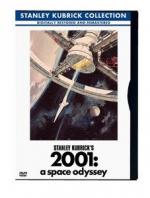|
This section contains 280 words (approx. 1 page at 300 words per page) |

|
As a film about progress—physical, social, and technological—Stanley Kubrick's huge and provocative 2001: A Space Odyssey remains essentially linear until its extraordinary ending. In the final transfiguration, director Kubrick and co-author Arthur Clarke … suggest that evolutionary progress may in fact be cyclical, perhaps in the shape of a helix formation. Man progresses to a certain point in evolution, then begins again from scratch on a higher level. Much of 2001's conceptual originality derives from its being both anti-Christian and anti-evolutionary in its theme of man's progress controlled by an ambiguous extra-terrestrial force, possibly both capricious and destructive….
2001 is, among other things, a slow-paced intricate stab at creating an aesthetic from natural and material things we have never seen before…. (p. 12)
If Kubrick's superb film has a problem, it may simply be that great philosophical-metaphysical films about human progress and man's relationship to the cosmos have one strike...
|
This section contains 280 words (approx. 1 page at 300 words per page) |

|


